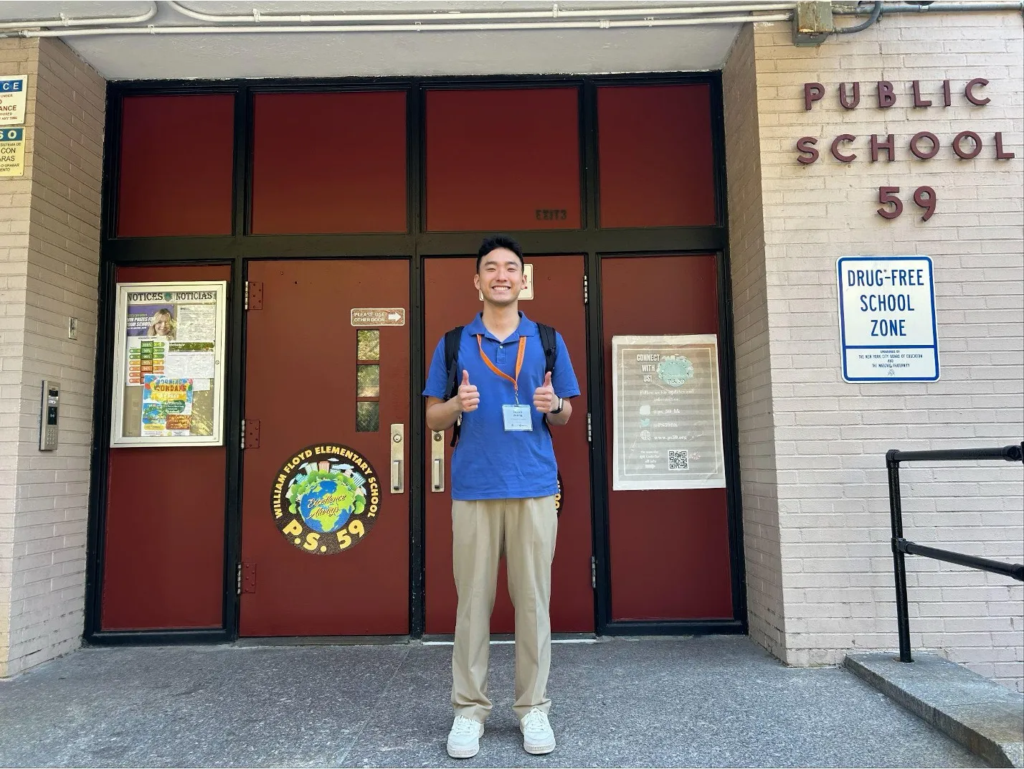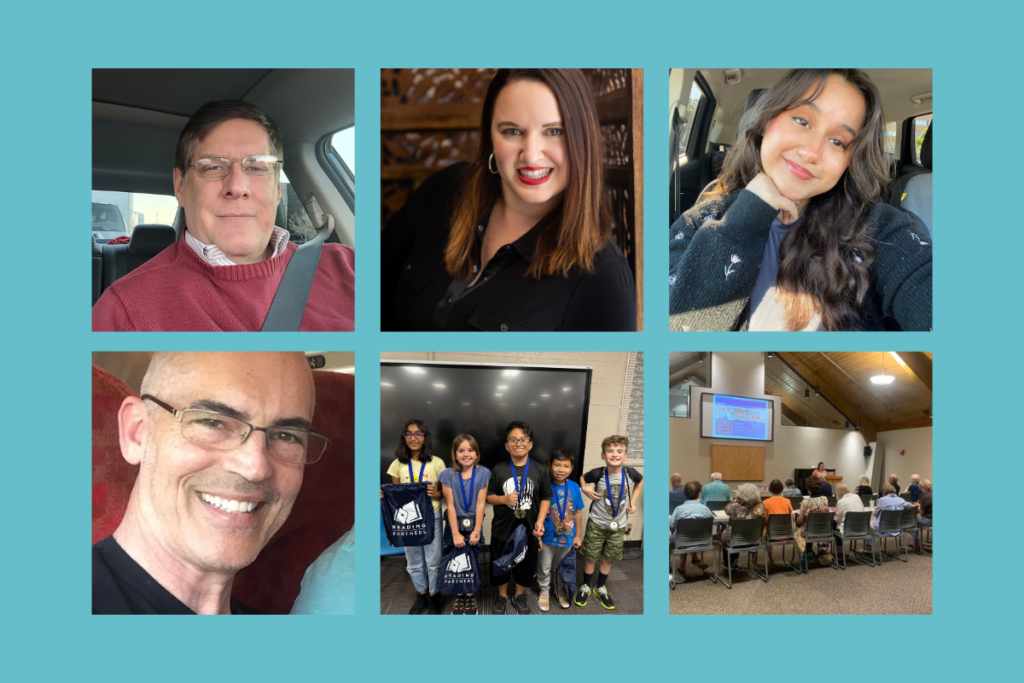Today we welcome Lisa Lazarus, Executive Director, Mid-Atlantic for Reading Partners to Good Works, to congratulate them on their 2013 award from the Washington Post Charities! Lisa has focused on education as a charter and traditional public school teacher, a central office administrator, and a policy practitioner. Prior to joining Reading Partners, Lisa held several leadership roles in the District of Columbia Public Schools, including Chief of Staff for the Deputy Chief of Teaching and Learning, Interim Co-Director of the Office of Secondary School Transformation, and Manager of Strategic Policy and Implementation in the Office of Out-of-School Time. Lisa graduated summa cum laude from Princeton University, earned her Master in Elementary Education from Lesley University and the Shady Hill School Teacher Training Course, and earned her Master in Public Policy at the Harvard Kennedy School of Government.
1.What motivated you to begin working with Reading Partners? What need does it fulfill and how are you (and your organization) working towards meeting it?
Reading Partners is inspiring because it provides a concrete and user-friendly way for our communities to support local schools and to address a critical problem in our city: the staggering achievement gap between students from affluent homes versus low-income ones. Reading Partners’ particular focus is on literacy and on ensuring that students from low-income communities who struggle with reading receive the individualized attention they need to succeed in school and beyond. Our model is all about recruiting and training community members to serve as a Reading Partner to a young student who will benefit from reading tutoring. My desire to join the Reading Partners team stemmed from my passion to support educational equity. I believe fully and completely that all young people deserve to develop the academic skills they need to choose their own life path, and I believe community service is an under-utilized resource in that work.
2.What exciting change or innovation is on your mind?
Front and center on my mind are all the student-focused enhancements to our curriculum this year. Reading Partners is devoting significant time, effort, and personnel to aligning our research-based curriculum to the Common Core State Standards (CCSS). This is exciting because it means our instructional materials are right on the pulse of all the latest thinking and best practices in elementary education. In addition to the CCSS project, Reading Partners is rolling out a new level of curriculum this year. The Emerging Reader level of our curriculum will focus on skill development for our students in grades K-3. Over the past few years, we have recognized the need to expand our instructional offerings in basic print concepts and phonological awareness so that our youngest readers get the exact skill reinforcement they need. I am excited to work for an organization that is willing to innovate, adapt, and create new materials in order to ensure tutors and students have exactly what they need.
3. Who inspires you (in the philanthropy world or otherwise)? Do you have a hero?
Gandhi’s reminder to “Be the change you wish to see in the world” is in my office, for that phrase reminds me to live with purpose, lead by example, and make the impact I believe our world needs. While these words guide and ground me, they also necessarily lead me to be inspired by our everyday heroes – our dedicated Reading Partners who give an hour or more of their time each week to tutor and mentor a student in our nation’s capital. Every week these men and women devote their time and energy, taking a tangible interest in a child’s life and thereby ensuring that our students have the concrete literacy skills the need to be successful. I am inspired by:
- Sonia, a high school student who is helping to organize her friends so they too become Reading Partners.
- Martin, a college student who takes time from his full course load to work with three students twice a week. Martin has put in additional time to learn his students’ specific needs in order to make students’ time in Reading Partners as impactful as possible. This year he is a team lead who is bringing more of his peers to the reading center each week.
- Yogi, a working professional who is volunteering with Reading Partners for his fourth year. Yogi makes time to come into Reading Partners every week, and he rearranges his meetings to be there for his student. Noah, Yogi’s last student, said that Yogi was not just “the best teacher I ever had” but also “the best friend I ever had”.
- Alexa, who spent over 40 hours with her student, Malachi, over the course of last year. With Alexa’s encouragement and focus, Malachi ended the year above grade level! Alexa is joining us as a Reading Partner again this year.
Each of these people, and our hundreds of other volunteers, are “being the change” they and we wish to see in the world. Our tutors demonstrate their commitment through their time in a Reading Partners reading center each week. I am incredibly inspired by and grateful for their dedication and generosity.
4.What is the single greatest challenge that your organization faces (besides finances) and how are you dealing with this challenge?
Our greatest challenge is building a volunteer movement that will result in thousands of volunteers who donate at least an hour a week to ensure that every student who needs personalized attention to learn to read receives it. We are working to build a cadre of people who identify as “Reading Partners” and who are proud to say, “I am a Reading Partner.” When this phrase becomes a household name; when churches, synagogues, youth groups, sororities and fraternities, kickball teams, book clubs, and parents decide to join the movement as Reading Partners; when together our community is addressing literacy proficiency skills by devoting an hour each week to supporting our teachers and schools by providing a young reader with one-on-one, individualized tutoring, then we will be able to ensure that all students – regardless of zip code or skin color or socioeconomic status – have access to the resources they need not only to learn to read, but also – and importantly – to read to learn.
5. What advice do you have for other people in your position?
Ask questions. Set ambitious yet attainable goals, and implement an accountability system to achieve them. Listen – to your colleagues, your volunteers, your board, your school-based stakeholders, your funders, your students’ parents and guardians, and most importantly, your clients – the students themselves. Listen also to your family and friends when they remind you, sometimes gently and other times necessarily more forcefully, to make time for yourself. Take care of yourself so you can continue to do the work you love. Take care of your body; lift weights, hike, run, swim, do yoga, bike, dance. Take care of your mind; read something that is not work-related, go to lectures, learn new things. Take care of your spirit in whatever ways are meaningful to you. Make the time to highlight and cultivate your colleagues’ talents. Learn from other executive directors who are doing incredible work in this area. Thank people. Call your grandmother. Eat nourishing food. Drink plenty of water. Laugh. Feel grateful to have a job about which you are so passionate. Revel in that even as you figure out a way to create a boundary between work and life outside of work. Have fun. And, always do what is best for our children.
6. Congratulations on receiving an award from the Washington Post charities!? What project is this grant supporting? What does this award mean to you or allow you to do?
Generous support from the Washington Post Charities helps to equip us with the resources we need to recruit hundreds of community volunteers to provide weekly, personalized reading tutoring to at least 600 students in 12 schools in 2013-14. Student enrollment in our local program has grown by 20-25% each year since our launch in 2010-11. In order to build and sustain the human capital and organizational capacity required to guarantee a high-quality learning experience for our students, we rely on local investors. The Washington Post Charities is an amazing partner to us, as they deeply understand the long-term importance of helping students to finish elementary school as confident, proficient readers. With our award from the Charities, we look forward to having the right people do the the right work to ensure that we can replicate last year’s outcomes, for 90% of target students in our program narrowed their achievement gap to their peers.
Catalogue for Philanthropy / Posted under Education-Guest Blogger / Source



